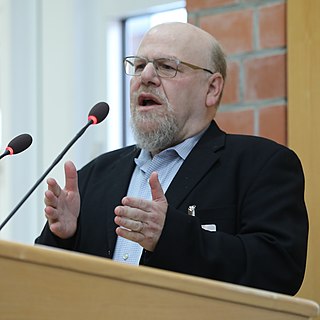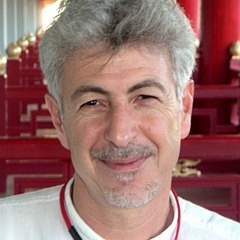Dr. Herbert Freeman was an American computer scientist who made important contributions to the field of automatic label placement, computer graphics, including spatial anti-aliasing, and machine vision.

Rensselaer Polytechnic Institute is a private research university in Troy, New York, with an additional campus in Hartford, Connecticut. A third campus in Groton, Connecticut, closed in 2018. RPI was established in 1824 by Stephen Van Rensselaer and Amos Eaton for the "application of science to the common purposes of life" and is the oldest technological university in the English-speaking world and the Western Hemisphere.

Raymond Samuel Tomlinson was an American computer programmer who implemented the first email program on the ARPANET system, the precursor to the Internet, in 1971; It was the first system able to send mail between users on different hosts connected to ARPANET. Previously, mail could be sent only to others who used the same computer. To achieve this, he used the @ sign to separate the user name from the name of their machine, a scheme which has been used in email addresses ever since. The Internet Hall of Fame in its account of his work commented "Tomlinson's email program brought about a complete revolution, fundamentally changing the way people communicate." He is credited with the invention of the TCP three-way handshake which underlies HTTP and many other key Internet protocols.

James Alexander Hendler is an artificial intelligence researcher at Rensselaer Polytechnic Institute, United States, and one of the originators of the Semantic Web. He is a Fellow of the National Academy of Public Administration.
Roland Walter Schmitt was an American physicist, business executive and the sixteenth president of Rensselaer Polytechnic Institute.
Michael Shur is a Russian and American physicist and a professor of solid state electronics and electrical engineering at Rensselaer Polytechnic Institute.
Contact dynamics deals with the motion of multibody systems subjected to unilateral contacts and friction. Such systems are omnipresent in many multibody dynamics applications. Consider for example
Don Millard is a Program Director at the National Science Foundation (NSF). Prior to joining NSF, he was a faculty member at Rensselaer Polytechnic Institute and the originator of the Mobile Studio Project. In 1999 he started thinking about a way to enable students to perform experiments anytime, anyplace—specifically those that use an oscilloscope, function generator, digital control, and some form of power supply. He started the Mobile Studio project by looking at commercially available solutions, which were prohibitively expensive; while choosing to involve students in bringing the project's vision to reality. Jason Coutermarsh, then a student at Rensselaer Polytechnic Institute (RPI), joined the project in the summer of 2004 and they developed a complete functional input/output board (IOBoard) hardware/software prototype. With the support of several technology companies and the National Science Foundation, the Mobile Studio Project is now being utilized to enhance science, math, engineering and technology education around the world.
Daniel Berg is a educator, scientist and was the fifteenth president of Rensselaer Polytechnic Institute.
Matthew Thomas Mason is an American roboticist and the former Director of the Robotics Institute at Carnegie Mellon University. Mason is a researcher in the area of robotic manipulation, and is the author of two highly cited textbooks in the field.
The history of Rensselaer Polytechnic Institute (RPI) spans nearly two hundred years beginning with its founding in 1824. RPI is the oldest continuously operating technological university in both the English-speaking world and the Americas. The Institute was the first to grant a civil engineering degree in the United States, in 1835. More recently, RPI also offered the first environmental engineering degree in the United States in 1961, and possibly the first ever undergraduate degree in video game design, in 2007.
John Matthew Hollerbach is a professor of computer science and research professor of mechanical engineering at the University of Utah. He is the editor of The International Journal of Robotics Research, a Senior Editor of Presence: Teleoperators & Virtual Environments, and a Governing Board member of the electronic journal Haptics-e.

Oussama Khatib is a roboticist and a professor of computer science at Stanford University, and a Fellow of the IEEE. He is credited with seminal work in areas ranging from robot motion planning and control, human-friendly robot design, to haptic interaction and human motion synthesis. His work's emphasis has been to develop theories, algorithms, and technologies, that control robot systems by using models of their physical dynamics. These dynamic models are used to derive optimal controllers for complex robots that interact with the environment in real-time.
Badrinath "Badri" Roysam is an Indian-American professor and researcher. He is the current chairman of the Department of Electrical and Computer Engineering at the University of Houston Cullen College of Engineering. Dr. Roysam is notable as the creator of the FARSIGHT project, which is a collaborative effort to create an open source software toolkit to analyze multidimensional images. Roysam's work as a researcher focuses on cancer immunotherapy and neuroscience.

Gregory D. Hager is the Mandell Bellmore Professor of Computer Science and founding director of the Johns Hopkins Malone Center for Engineering in Healthcare at Johns Hopkins University.
Mengchu Zhou is a Chinese-American Distinguished Professor of electrical and computer engineering in the Helen and John C. Hartmann Dept. of Electrical and Computer Engineering at New Jersey Institute of Technology (NJIT) and at Macau University of Science and Technology. He is the Chairman of IKAS Industries of Shenzhen in China and a Board Member of OneSmart Education Group headquartered in China.

Vincent Meunier is a Belgian/American condensed matter and materials physicist known for his theoretical and computational research on electronic, optoelectronic, and structural properties of low-dimensional materials. He is the Department Head and P. B. Breneman Chair and Professor in the Department of Engineering Science and Mechanics at Pennsylvania State University. Among his contributions are the quantum mechanical description of processes responsible for scanning tunneling image formation in low-dimensional materials, the development of a microscopic theory of nanocapacitors, and contributions to the theory of electronic transport and ultra-low frequency vibrational modes in van der Waals heterostructures. He is a Fellow of the American Physical Society (APS), of the Institute of Physics (IOP), and of the American Association for the Advancement of Science (AAAS). He is the founding Editor-in-Chief of the Open Access Elsevier journal Carbon Trends.
Achille Messac is the Dean of the College of Engineering, Architecture and Computer Sciences at Howard University. He has previously served as Professor of Aerospace Engineering Mississippi State University. He was elected a Fellow of the American Association for the Advancement of Science in 2019.
Nambirajan Seshadri is a professor of practice at the Department of Electrical and Computer Engineering, Jacobs School of Engineering, University of California, San Diego.





